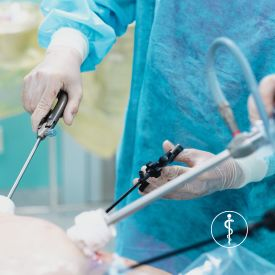Minimally Invasive Surgery

Dr. Mohit Agrawal is a renowned expert in minimally invasive surgery, offering patients advanced surgical solutions with a focus on faster recovery, minimal pain, and reduced scarring. With years of experience and a commitment to precision, Dr. Agrawal is well-versed in the latest techniques and technologies in the field of minimally invasive surgery, providing superior care for a wide range of conditions. His expertise spans various medical disciplines, allowing patients to benefit from cutting-edge treatments without the need for large, invasive incisions.
Minimally invasive surgery (MIS) is a modern surgical technique that involves the use of small incisions, specialized instruments, and advanced imaging technologies. Unlike traditional open surgery, which requires large incisions to access internal organs, MIS utilizes tiny cuts—typically 5-6 cm in length—through which the surgeon performs the procedure. This method significantly reduces the physical impact on the patient, leading to faster healing and fewer complications.
Minimally invasive surgery is widely used to treat conditions affecting the heart, abdomen, chest, and various other areas of the body. One of the most common forms of MIS is laparoscopic surgery, where a thin, flexible tube equipped with a camera (laparoscope) is used to view internal structures on a screen, allowing the surgeon to operate with enhanced precision.
The growing popularity of minimally invasive surgery can be attributed to the numerous advantages it offers over traditional open surgery. Some of the key benefits include:
Dr. Mohit Agrawal specializes in performing minimally invasive surgery to treat a variety of medical conditions in locations Kandivali, Goregaon, Malad, Borivali. Some of the most common conditions treated using MIS techniques include:
Minimally invasive surgery is typically performed under general anesthesia, ensuring that the patient remains comfortable throughout the procedure. The surgeon makes several small incisions (also known as ports) through which they insert specialized surgical instruments and a laparoscope. The laparoscope is equipped with a high-definition camera that provides a clear view of the internal structures on a monitor, allowing the surgeon to perform the procedure with greater accuracy.
In certain cases, such as abdominal surgeries, the surgeon may inflate the abdomen with carbon dioxide gas to create more space and improve visibility. This helps ensure that the surgeon can operate without damaging surrounding tissues. Once the surgery is complete, the gas is released, and the incisions are closed using stitches or surgical glue.
One of the major advantages of MIS is the precision it allows, which results in less trauma to surrounding tissues and organs. This is particularly beneficial for complex surgeries, where minimizing damage to healthy tissue is crucial for a successful outcome.
After minimally invasive surgery, patients can typically expect a faster and easier recovery compared to traditional open surgery. However, proper postoperative care is essential to ensure optimal healing and to prevent complications. Dr. Mohit Agrawal provides each patient with a personalized recovery plan, which may include the following recommendations:
As with any surgical procedure, minimally invasive surgery carries some risks. While the risks are generally lower than those associated with open surgery, potential complications may include:
Preparation may include:
1) Fasting for several hours before the procedure.
2) Stopping certain medications, especially blood thinners, as directed by your doctor.
3) Completing any necessary pre-operative tests like blood work or imaging.
4) Arranging transportation and support for after the surgery.
Some medications may need to be paused or adjusted before surgery. Inform your surgeon about all medications and supplements you take to receive proper guidance.
The duration of the surgery depends on the specific procedure but is typically shorter than traditional open surgery. Your surgeon will provide an estimated time during the consultation.
You may be instructed to follow a clear liquid or light diet before surgery, depending on the procedure. Specific instructions will be provided by your healthcare team.
Most minimally invasive surgeries require a shorter hospital stay, often just one or two days. Some procedures may even be done on an outpatient basis.
Minimally invasive surgery usually results in less post-operative pain compared to open surgery. Pain management will be tailored to your needs with medications or other techniques.
Recovery times are typically faster with minimally invasive surgery. Many patients can resume light activities within a few days and return to normal routines within 2–4 weeks.
Contact your doctor immediately if you experience:
1) Excessive pain not relieved by medication.
2) Fever or chills.
3) Redness, swelling, or discharge at the surgical site.
4) Shortness of breath or chest pain.
This depends on the underlying condition. Your doctor may recommend dietary adjustments, weight management, or regular physical activity to support long-term health.
Follow your doctor’s recovery plan, which may include:
1) A balanced diet rich in fruits, vegetables, lean protein, and whole grains.
2) Staying hydrated.
3) Gradual return to exercise.
While some conditions are unavoidable, maintaining a healthy lifestyle, managing chronic conditions, and attending regular medical check-ups can reduce the likelihood of future surgeries.
Yes, pre-surgery anxiety is common. Discuss your concerns with your doctor, and consider relaxation techniques like deep breathing or meditation. Having a strong support system can also help.
Recovery can be emotionally challenging. Focus on small milestones, engage in activities you enjoy, and lean on friends, family, or support groups for encouragement.
While some patients may experience temporary emotional ups and downs, many find that resolving their health issues improves their overall mental well-being.
Don’t hesitate to reach out to your healthcare provider or a counselor if you feel emotionally overwhelmed. Joining support groups can also provide reassurance and camaraderie.
Ready to take the next step towards expert and personalized care for Minimally Invasive Surgery?
Contact us today to schedule your consultation. Our experienced Minimally Invasive Surgery team is here to provide expert guidance and ensure your comfort throughout the process.